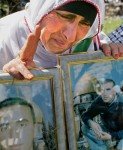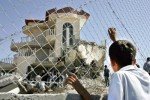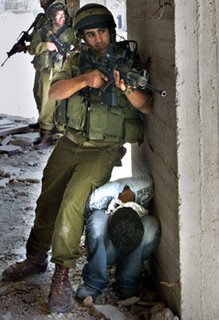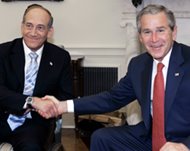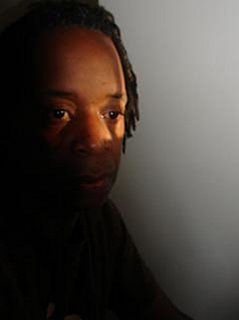"The Palestinians Must Pay a Price for Their Choice"
Surrender vs. the Right to Exist
By KATHLEEN CHRISTISON
Former CIA analyst
Noting that he had been raised with the deep conviction that the Jewish people would never have to relinquish any part of the "land of our forefathers," Ehud Olmert told Congress in his address to a joint session on May 24, "I believed, and to this day still believe, in our people's eternal and historic right to this entire land." He did then concede that dreams alone cannot bring peace and will not preserve Israel as a "secure democratic Jewish state." But what stands out in this little-noted statement of Jewish attachment to the land is its affirmation of a supreme Jewish right to all of Palestine, never mind who else may live there. In the context of any hope for a just and equitable peace agreement between Israel and the Palestinians, this is a deal-breaker par excellence.
In light of this official Israeli view that the Jewish people have "an eternal and historic right to this entire land," one is startled by the hypocrisy of the demand -- enunciated universally by Israel, the U.S., the EU, and most of the rest of the international community -- that the Palestinians must recognize Israel's "right to exist" before anyone will even speak to them, before they can be admitted to civilized company in the world. Does this demand that Palestinians recognize Israel's right to exist mean that they must recognize Israel's "right to the entire land" as defined by Olmert? And if that is the case, how could the Palestinians possibly be assured, even if Israel were magnanimously to grant them a "state" or a "Bantustan" in a part of that "entire land," that Israel would not at some future date take it back, since Jews have "an eternal and historic right" to it? Why should anyone believe that any Israeli concession of land would be permanent?
Olmert's assertion of this all-encompassing Jewish "right" is certainly not a new feature of Israeli and Zionist dogma. The notion has underlain Zionism from the beginning, hidden sometimes behind a leftist veneer of accommodation to the reality of the Palestinian presence in this sacred Jewish land, but never very far beneath the surface. The Zionist belief in Jewish supremacy has never truly been hidden. I ran into this in crude form a few years ago. Shortly after the Palestinian intifada began in 2000, an acquaintance -- no friend, but an irritating bigot who always argues Israel's case openly on the basis that Jewish interests are superior to Palestinian interests -- wrote me an email in which he concluded that, because there is "simply not enough room in Palestine for both Jews and Palestinians," the Palestinians should "go back to Jordan, where they came from" and leave Palestine to the Jews, who own it and so badly need a homeland. (The erroneous notion that Palestinians came from Jordan is a conscience-clearing artifact of the Zionist imagination, designed to "prove" that Palestinians did not originally come from Palestine, are simply interlopers in a Jewish land, and therefore will not be hurt or inconvenienced by "going back" where they came from.) I told him he was factually wrong and completely immoral -- which I'm sure did nothing to burden his conscience, but which did serve, blessedly, to end our correspondence.
The particular argument put forth by this particular man expresses more crude racism than most supporters of Israel would admit to feeling, but in fact his position reflects the official views of the Israeli government and of the U.S. government that supports it. Ultimately, his position, which is of course identical to Olmert's, captures the essence of Zionism and defines what has been the basis of U.S. policy toward Israel and Zionism since well before the state of Israel was established 58 years ago: that is, that  Israel's interests as a Jewish state and Israel's "rights" always take precedence, no matter what the interests and rights of the Palestinians, and that Palestinian needs can be accommodated only when these do not interfere with Israel's or when Palestinians give in to Israel's demands. At bottom, this is a policy based on the assumption that there is "simply no room in Palestine for both Jews and Palestinians" and that the only possible solution over the long term is for the Palestinians to disappear in some fashion. As the PLO ambassador to the U.S., Afif Safieh, is fond of saying, Israel wants the Palestinians' geography but not their demography -- the land but not the people.
Israel's interests as a Jewish state and Israel's "rights" always take precedence, no matter what the interests and rights of the Palestinians, and that Palestinian needs can be accommodated only when these do not interfere with Israel's or when Palestinians give in to Israel's demands. At bottom, this is a policy based on the assumption that there is "simply no room in Palestine for both Jews and Palestinians" and that the only possible solution over the long term is for the Palestinians to disappear in some fashion. As the PLO ambassador to the U.S., Afif Safieh, is fond of saying, Israel wants the Palestinians' geography but not their demography -- the land but not the people.
This Palestinian disappearance can be accomplished in one of several ways, by Israeli calculation. First, they could be induced to leave Palestine altogether; Israel has been working since its creation on some version of this option -- outright expulsion, as occurred in 1948, or inducing a "voluntary" exit by making life insupportable, as is occurring today -- as the best way to relieve itself of the Palestinian "problem." Or, as a second option, the Palestinians could be forced into submission; this has been the fate of the 20 percent of Israel's population that is Palestinian, and it was the fate of West Bank-Gaza Palestinians during the first 20 years of the occupation when they were quiescent under Israeli control. This option is no longer feasible from Israel's standpoint, however, since there are now or soon will be more Palestinians than Jews in Palestine, which makes the job of forcing submission too unseemly for a state claiming to be democratic. Or, as a third option, the Palestinians could be lulled into a political submissiveness that leads them, out of desperation, to accede to every Israeli condition; this is what Yasir Arafat did by signing on to the Oslo agreement and recognizing Israel's "right" to exist, thus giving away all the Palestinians' negotiating cards without securing in return any Israeli agreement to do more than conduct negotiations.
Since this third option collapsed at Camp David in 2000, Israel has reverted to working on the first option. The Oslo process failed essentially because Arafat woke up at the last moment, after Israel had tried to force feed a totally unsatisfactory final agreement, and refused to be lulled into complete capitulation. Since Arafat's awakening, the Israeli agenda, supported wholeheartedly by the U.S. and to a lesser extent by the rest of the West, has been to pursue option one, inducing the Palestinians in one way or another to leave Palestine altogether -- in other words, attempting to force the Palestinians' abject surrender on terms that assume total Jewish supremacy.
The U.S. and the West are working hard to help Israel enforce this surrender. While the Palestinians starve under the international community's aid cutoff, media leaders like the Washington Post set the tone by blaming the Palestinian victims. "Palestinian leaders," the Post intoned in a recent editorial describing the aid crisis, "have a long tradition of exploiting the suffering of their own people for political ends; Hamas has been content to foster a humanitarian crisis in the West Bank and Gaza Strip." If the logic of this charge that the Palestinians caused their own catastrophe because they failed to vote the way Israel and the Post wanted and because Hamas refuses to give in to Israel's dictates is not immediately clear, it helps to understand that the basic assumption of Israel and its supporters in the U.S. is that Israel's demands and rights always take precedence and the Palestinians are acceptable only if they always recognize this.
Shortly after the Hamas election in January, Robert Satloff, director of the Washington Institute for Near East Policy -- the think tank affiliated with the Israeli lobby organization AIPAC -- laid out the essential demand on the Palestinians. Appearing on the Lehrer News Hour, Satloff declared that the Palestinian people must pay a price for their choice and that it should be a "strategic objective" of the world community to bring down the Hamas government. Twenty years ago, Satloff observed with astounding arrogance, the PLO acceded to what he called the "minimum entry requirements" by recognizing Israel -- entry, that is, to Israel's and the lobby's world, where Jews have the superior rights in Palestine and hold the whip hand and where Palestinians count only when they bow to this Jewish supremacy.
This do-as-I-say-or-else approach now characterizes all Israeli and Western attitudes toward the Palestinians and informs the demand that Hamas recognize Israel's right to exist. In a press conference with Olmert on May 23, Bush chided the Palestinians, declaring that no country (meaning Israel) "could be expected to make peace with those who deny its right to exist." Yet the Palestinians themselves are expected to make peace with those who deny their right to exist as a nation. Bush sees no contradiction here because he cannot see past the assumed supremacy of Israel's rights in Palestine.
The Hamas election, and Israeli and Western reaction to it, have in fact exposed the basic problem with all peace negotiations as framed by Israel and the U.S. for the last several decades: Palestinians have been allowed to participate -- have been given any role at all in reconciliation efforts -- only when they have agreed to go along with Israel's demands. But this principal demand on the Palestinians is a fundamental obstacle to any real resolution of the conflict. The insistence that the Palestinians "recognize Israel's right to exist" does not mean, to Israel and the U.S., simply that the Palestinians must pledge not to throw Jews into the sea. Refraining from this drastic step is fairly easy even for the most militant of Islamists. It means instead recognizing Israel's moral legitimacy. For a Palestinian this means recognizing -- indeed, embracing as a moral imperative -- Israel's right to have expelled the Palestinians and taken their homes and their land.
This demand ignores the reality that Israel was established as a specifically Jewish entity in a land populated overwhelmingly by non-Jews and that maintenance of its Jewish majority required the expulsion of much of that non-Jewish population. To paraphrase George Bush, no people can be expected to make peace with, or to recognize the moral legitimacy of, those who have attempted and are still attempting to destroy them. The demand for Palestinian recognition of Israel's moral legitimacy presupposes a priority of Israeli over Palestinian interests in peace negotiations that totally undermines any negotiating process intended to deliver justice to both sides. This Palestinian recognition cannot be the central prerequisite of any peace process -- to be compulsorily accepted before the process even begins -- when Israel refuses to recognize a similar moral right for the Palestinians.
The PLO did recognize Israel's right to exist in 1988 as a condition of its participation in peace negotiations, but any continuing Palestinian obligation to adhere to this recognition has been obviated by Israel's refusal to offer a reciprocal recognition of the Palestinians' existence. The grave injustice inflicted on the Palestinians in 1948 and in the decades since has never been redressed, and this must be the centerpiece of any negotiating process. For the very reason that there is no established Palestinian state, the core issue in any negotiation should be, not recognition of Israel's legitimacy, but recognition of the Palestinians' right to exist as an independent, viable, sovereign state. Israel exists and is in no danger of ceasing to exist; continued concern about its existence and continued demands that Palestinians recognize it as a Jewish state, without a demand for reciprocation from Israel, constitute an affirmation that Jewish rights are superior. This is a fundamentally unjust and immoral presumption in international relations, as in all human relations. Neither Israel nor the United States will ever have peace until Israel is made to recognize the people it displaced in Palestine as equals in the land.
Kathleen Christison is a former CIA political analyst and has worked on Middle East issues for 30 years. She is the author of Perceptions of Palestine and The Wound of Dispossession. She can be reached at kathy.bill@christison-santafe.com..